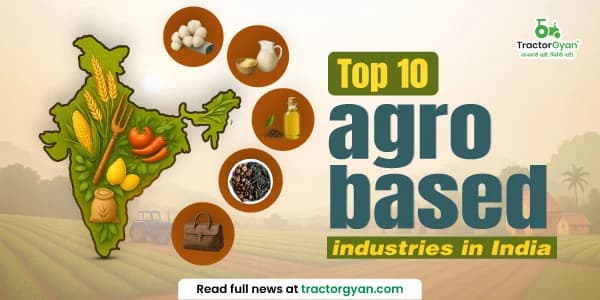Top 10 agro-based industries with examples in India 2025-2026
Table of Content
Agriculture is growing and expanding day by day. Along with technological advancements, the change in climatic and weather conditions paved the way for the growth of crops and the development of industries.
They all play a crucial role in supporting the economy of a nation, providing employment, and supporting the agriculture industry by all means possible. In this post, we’re going to explain everything related to agro-based industries, agro-based industry examples, types of agro-based industries, and other note-worthy details. So, if you’re interested in starting up an agro industries in india or an agro-based industry business, stay tuned for expert-led information on this topic.
What Do You Mean By Agro-Based Industry?
Agro-based industries or agro-processing industries, are those that derive their raw materials primarily from the agricultural sector and supply necessities to this industry.
Mainly, these industries are handling work related to processing, transforming, and adding value to agricultural products so that they turn into various finished goods that are ready to deliver.
For any nation's agro-industry, agro-based industries play a vital role as they bridge the gap between primary agricultural production and the final consumer market.
Agro-based industries encompass a wide range of sectors, including food processing, textiles, biofuels, animal feed, dairy products, beverages, spices, and more. These industries utilize raw materials such as crops, livestock, fruits, vegetables, grains, fibers, and other agricultural commodities as their primary inputs.
The objective of agro-based industries is to enhance the value, quality, and marketability of agricultural products through processing, preservation, packaging, and value addition. They often employ advanced technologies, machinery, and expertise to transform raw agricultural materials into finished goods that are ready for consumption or use in other industries.
The agro-based industries can be collectively classified into two broad terms: food processing agro-based industries and non-food processing agro-based industries:
- Food processing industries: Food processing industries are involved in the conversion of agro-based products into processed food items for human consumption. They include activities such as cleaning, sorting, grading, preserving, packaging, and transforming raw agricultural materials into various food products. Examples of food processing industries include dairy processing, grain processing, meat processing, bakery processing, and poultry processing.
- Non-food Processing Industries: Non-food processing industries utilize agricultural raw materials to produce non-food products, such as industrial materials, biofuels, and other products. These industries often focus on extracting and refining specific components of agricultural products. Examples of non-food processing industries are textile & fiber processing, biofuel processing, medicine processing, and so on.
Types of Agro-based Industries In India
There are mainly four main types of agro-based industries In India named as produce processing units, input manufacturing units, produce manufacturing units, and agro-service centers are the four primary categories of agro-based industries.
Below, you'll find agro-based industry information in India.
- Agro-Produce Processing Units: This sector deals with the processing and storage of agriculturally based raw materials. Utilizing agricultural by-products of raw resources is another concern.
- Agro-Produce Manufacturing Units: This sector of the agricultural economy focuses on the production of raw materials. After production, the final product is entirely distinct from the raw material that was used.
- Agro-input manufacturing facilities: The goods produced in this sector are utilized as inputs to boost agricultural output.
- Agro Service Centers: All farm-related equipment is repaired and serviced at these service facilities. Due to its focus on agricultural equipment, this industry is a subset of those that are agriculture-based industries.
Agro-Based Industry Examples
Different types of agro-based industries operate in different working conditions. However, the only common thing among all the agro-based industries is that they make use of raw materials. Examples of agro-based industries are as follows:
- Agro-produce processing units examples - pulses and rice processing mills.
- Agro-produce manufacturing units examples - bakery, sugar, and textile factory or industry.
- Agro Input manufacturing units examples - pesticides, fertilizers, and tools.
- Agro service centers examples - the servicing and repairing of farming equipment like tractors, and diesel engines.
List of Top 10 Agro-Based Industries in 2026

- Textile Industry
- Industry of Food Processing
- Industry of Dairy
- Industry of Sugar
- Industry of Vegetable Oil
- Industry of Tea
- Industry of Coffee
- Industry of Leather Goods
- Industry of Bamboo
- Industry of Jute
India's Top 10 Agro-Based Industries List – An Overview
The following is a list of India's top 10 agricultural-based industries. Have a look at it.
#1- Textile Industry

The textile industry is responsible for the design, manufacture, distribution, and marketing of yarn, textiles, and ready-to-wear garments. Cotton textiles, woolen textiles, silk textiles, synthetic fibers, and jute textiles are all produced here.
This agro-based business is India's second-largest employment generator, after agriculture. Hence, it plays a vital part in the country's economy.
India's textile industry is the country's largest agro-based sector. Garment production is the focus of this sector. It is a self-sufficient industry that manufactures everything from raw materials to finished value-added products for its customers.
#2- Industry of Food Processing

The agro-processing industry or food processing business in India is one of the world's largest, making it the country's fifth-largest industry and the most important agro-based industry. Dairy, sugar, vegetable oil, and tea/coffee processing industries are among India's most important food processing sectors.
#3- Industry of Dairy

The dairy industry is one of India's most important industries, accounting for up to 4% of the country's GDP. It is one of the best sources of second-hand money for Indian farmers, making it one of the most popular occupations in rural areas across the country.
For many years, it has been practiced all over India, resulting in India contributing 20% of the total global milk supply. The raw material in this agro-based business is Milk, while the finished products from this industry are Butter, Cheese, Cream, Condensed Milk, Dried Milk, Packaged Milk, Ice Cream, etc.
#4- Industry of Sugar

The fourth agro-based industry on the list is the sugar industry is in charge of supplying sugar, which is an essential component of the human diet. During 2019-20, India slid to second place in sugar output, narrowly losing the top title to Brazil. India produced 28.9 million metric tonnes of sugar, accounting for nearly 17% of global sugar production of 166.18 million metric tonnes.
#5- Industry of Vegetable Oil

The Indian vegetable oil business produces around 5% of the world's vegetable oil. India is the world's largest user of edible oils. In addition, India is the world's largest importer of edible oils, with 15 million tonnes imported yearly, accounting for roughly 14% of global vegetable oil imports. In 2020, India alone consumed 22 million metric tons of vegetable oil.
In the Indian diet, vegetable oil is the primary source of fat. Vanaspati is a type of hydrogenated vegetable oil popular in India. Depending on the technology used, different locations employ different materials. Coconut, mustard, and groundnut are the most prevalent raw materials used in agro-processing industries.
#6- Industry of Tea

After water, tea is the second most-consumed liquid on the planet. In addition, India is one of the world's major tea consumers, consuming around three-quarters of global production. Assam, West Bengal, and Kerala are the primary producers of tea. This agro-based industry operates all year and employs approximately 1 million people.
#7- Industry of Coffee
India is a tea-loving country. But, in the last two decades, we have seen an extraordinary increase in the number of coffee drinkers; India is now the world's sixth-largest producer and exporter of coffee. In 2022, coffee production totaled 3,93,400 metric tonnes that's why agro-processing industries of coffee also play a vital role.
#8- Industry of Leather Goods

One of the most commonly traded commodities on the planet is leather. The Indian leather industry produces around 12.93 percent of the world's leather hides and skins. In addition, India's overall exports of leather and leather products were 326 billion Indian rupees in the year 2022.
Hides and skins from cattle, large animals, and small animals such as sheep and goats are the primary raw materials used in this sector. Kanpur is known in India for its leather industries, and it boasts some of the best leather companies in the country, which are known for their high-quality products. This agro-based business is also noted for employing a significant number of young people, providing a large number of job chances for our country's youth.
#9- Industry of Bamboo

The bamboo plantation is a common practice in India's eastern regions, and it provides a valuable source of income for these areas. Bamboo-based sustainable products are becoming increasingly popular as environmental challenges are brought to light.
#10- Industry of Jute

The jute industry is one of West Bengal's most prominent sectors, with 60 of the state's 70 jute mills located along the Hooghly River's banks. The jute business is a significant agro-based industry in India, supporting the livelihoods of over 4 million people. The jute sector is currently expanding at a rapid pace, and it has now established itself as an important part of our economy.
Challenges Faced While Setting-up Agro Based Industries In India
While agro-based industries in India have bright futures and provide substantial revenue and growth opportunities, it’s not easy to get started. Here is a list of challenges that one might face to set up an agro-based business in India.
- An irregular monsoon could affect the supply of basic materials.
- The diversity of agricultural products and the lack of an appropriate approach stop people from choosing the agro based industries that are best suited to a particular region.
- A seasonal supply of agro-based products may cause the units' capacity to be underutilized because they won't be operating all year.
- Fruit and vegetable-based industries might not always receive the same variety and quality. Hence, revenue is uneven.
- Fluctuations in raw material availability, pricing, and demand throughout the year can pose challenges in maintaining a consistent production and supply chain.
- Efficient supply chain management is vital for agro-based industries. However, inadequate transportation infrastructure, poor connectivity between production areas and markets, and lack of proper logistics can lead to delays, wastage, and increased costs.
- The adoption of advanced technologies and modern farming practices is crucial for the success of agro-based industries. However, there is a major lack of awareness, limited access to technology, and a skilled workforce in the rural areas of India that can impede the adoption of modern practices.
- The entrepreneur is unable to make use of the opportunities that are available since there is a lack of institutional support in these areas. The wealthy in rural areas can truly take advantage of this industry and aid in creating jobs for many people. However, no policy has made provision for this.
- The amount and caliber of raw resources vary in agro-based industries. Variations in weather and soil conditions hurt the number of raw resources. Because of a lack of standardization, the quality decreases. These elements put additional pressure on production, scheduling, and quality control activities in agro-based companies.
The Significance of Agro-based Industries in India
- Agro-based industries are mainly responsible to remove unemployment and create further employment opportunities for rural areas such that most of the rural population does not migrate to urban lands.
- Setting up an agro-based industry supports the growth of industry and agriculture.
- When considerable investment is required for an activity, people can collaborate, which promotes the cooperative growth of all groups.
- These actions assure total usage of raw resources, many of which would otherwise be wasted due to their short shelf lives.
- Several businesses, such as food processing, have significant export potential abroad.
- Even though agriculture suffers greatly economically in many ways, there is always room for innovation in agro-based sectors, which benefits human development.
How To Start Your Own Agro-based Industry In India?
- Learned about agro-based industries in India and now want to set up one? Well, you need to understand that success is only sure when you do strategic planning and execute it perfectly. In this section, we’re going to explain some basics of setting up an agro-based industry.
- First thing first, conduct thorough market research to identify the potential demand for your agro-based products in your area. India's geographical conditions and market demand are so diverse that each region has specific demands and you need to gather this information. Analyze the market trends, competition, and consumer preferences to find out which type of agro-based industry you should set up.
- Once that's sorted, develop a comprehensive business plan outlining your goals, target market, product offerings, marketing strategies, operational details, and financial projections. This plan will serve as a roadmap for your business and help you know where you should head.
- Learn about the legal and regulatory frameworks that apply to your agro-based industry in India. Try to comply with the licenses, permits, certifications, and any specific regulations and register your business.
- Choose an appropriate location for your agro-based industry. You need to keep factors like proximity to raw materials, transportation facilities, availability of skilled labor, access to markets, and infrastructure support in mind while selecting the location for an agro-based business.

- Get the funding only from trusted sources. The Indian government offers multiple grants, subsidies, tax incentives, credit support, and infrastructural support for those who want to contribute to strengthening the Indian economy with agro-based industries. Learn about these schemes and enjoy their benefits.
- Build a strong supply chain system to ensure a steady and reliable supply of agro-based raw materials and produce goods/products.
- Invest in suitable machinery, equipment, and technologies to optimize production processes.
- Remember that setting up an agro-based industry requires careful planning, adequate resources, and a thorough understanding of the market dynamics. It is advisable to seek professional guidance and consult with experts in the field to maximize your chances of success.
Conclusion
All of these agro-industries are critical to the economy of our country. Because they employ a big portion of our population while also sustaining our economy. The profit proportion of farmers is also determined by the demand from these businesses. Although other factors play a role, once the ultimate crop is produced, it is entirely dependent on industry demand. As a result, agricultural and agro-based industries are mutually reliant on one another for growth.
Category
Read More Blogs
Commercial farming, a key pillar of modern agriculture, plays a pivotal role in meeting the global demand for food, raw materials, and exports. By focusing on cultivating a single crop over extensive areas, commercial farmers optimize production and contribute to the economy.
In...
The world sure moves faster than we think, but not every advancement is a boon, especially when it comes to farming. Growing crops does not require chemicals or other artificial amenities in some areas of the farming industry. Rather than using chemicals...
Being a Farmer the most important task falls under his role is the health of the soil and crop and to maintain the adequate health and fertility of the soil the most essential aspect which needs to be taken into consideration...
Write Your Comment About Top 10 agro-based industries with examples in India 2025-2026
.webp&w=1920&q=75)
Top searching blogs about Tractors and Agriculture
07 Jan 2026
18 Dec 2025
29 Jul 2025
08 Sep 2025
03 Jul 2025
30 Jul 2025
30 Jul 2025
30 Jul 2025
29 Jul 2025
30 Jul 2025
09 Feb 2026
31 Jul 2025
18 Dec 2025
26 Dec 2025














.webp&w=2048&q=75)









.webp&w=2048&q=75)
.webp&w=2048&q=75)




























